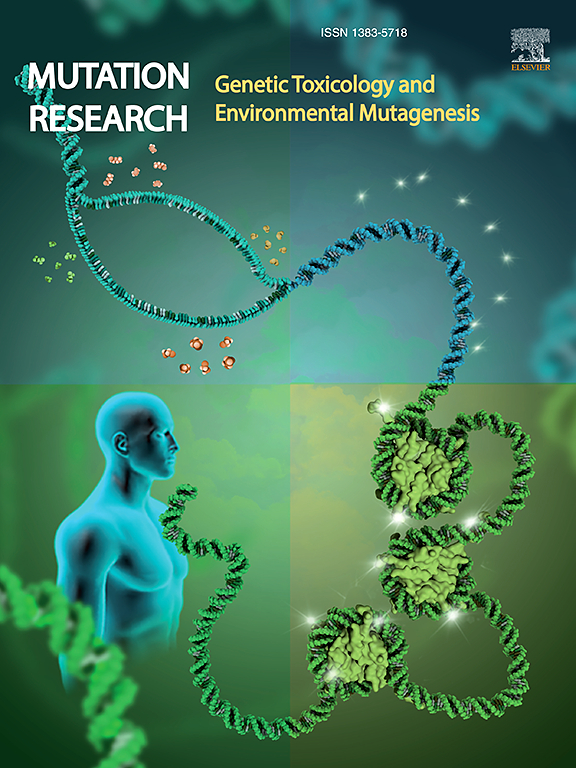Acute and chronic post-COVID-19 conditions: A study of genetic integrity and clinical markers
IF 2.5
4区 医学
Q3 BIOTECHNOLOGY & APPLIED MICROBIOLOGY
Mutation research. Genetic toxicology and environmental mutagenesis
Pub Date : 2025-04-23
DOI:10.1016/j.mrgentox.2025.503870
引用次数: 0
Abstract
The long-term effects of COVID-19 infection on genomic integrity, along with hematological, biochemical, and inflammatory, remain poorly understood. Viral infections, including SARS-CoV-2, are known to induce genomic instability, potentially contributing to the persistence of post-COVID-19 symptoms. This study aimed to assess genomic instability in individuals with acute and chronic post-COVID-19 conditions, alongside hematological profiles, metabolic parameters, and inflammatory markers, compared to a SARS-CoV-2-negative control group. Participants (n = 231) from southern Brazil were stratified into acute post-COVID (n = 78), chronic post-COVID (n = 79), and control groups (n = 74). DNA damage was assessed using alkaline and enzyme-modified comet assays. Oxidative lesions were detected across all groups, but no significant differences were observed among them. Correlations with biochemical markers suggest inflammation and oxidative stress as central mechanisms in post-COVID-19 pathophysiology. Hematological and biochemical analyses revealed persistent inflammation, lipid metabolism disruptions, and gender-specific alterations, such as higher levels of inflammatory markers (C-reactive protein and ferritin) and lipid abnormalities in men, whereas women exhibited distinct hematological patterns. Age-related influences on metabolic and inflammatory markers further illustrate the systemic complexity of post-COVID-19 effects. The chronic group exhibited ongoing but attenuated markers of inflammation and oxidative stress compared to the acute group. These findings suggest that genetic instability alone may not fully explain the observed clinical manifestations, emphasizing the role of persistent inflammation and metabolic dysregulation. This study provides a comprehensive view of the interplay between genomic instability, inflammation, oxidative damage, and systemic alterations in post-COVID-19 condition. It underscores the importance of a multifaceted approach to understanding disease mechanisms and the need for longitudinal studies to explore the dynamic nature of these alterations and their long-term health implications.
急性和慢性covid -19后疾病:遗传完整性和临床标志物的研究
COVID-19感染对基因组完整性以及血液学、生化和炎症的长期影响仍知之甚少。众所周知,包括SARS-CoV-2在内的病毒感染会导致基因组不稳定,可能导致covid -19后症状的持续存在。该研究旨在评估与sars - cov -2阴性对照组相比,急性和慢性covid -19后疾病患者的基因组不稳定性,以及血液学特征、代谢参数和炎症标志物。来自巴西南部的参与者(n = 231)被分为急性covid后(n = 78)、慢性covid后(n = 79)和对照组(n = 74)。采用碱法和酶修饰的彗星法评估DNA损伤。各组均有氧化损伤,但各组间无显著差异。与生化标志物的相关性表明,炎症和氧化应激是covid -19后病理生理的核心机制。血液学和生化分析显示持续炎症、脂质代谢紊乱和性别特异性改变,如男性炎症标志物(c反应蛋白和铁蛋白)水平较高和脂质异常,而女性表现出独特的血液学模式。年龄对代谢和炎症标志物的影响进一步说明了covid -19后影响的系统性复杂性。与急性组相比,慢性组表现出持续但减弱的炎症和氧化应激标志物。这些发现表明,遗传不稳定可能不能完全解释观察到的临床表现,强调持续炎症和代谢失调的作用。这项研究提供了基因组不稳定性、炎症、氧化损伤和covid -19后全身改变之间相互作用的全面观点。它强调了从多方面了解疾病机制的重要性,以及进行纵向研究以探索这些变化的动态性质及其对健康的长期影响的必要性。
本文章由计算机程序翻译,如有差异,请以英文原文为准。
求助全文
约1分钟内获得全文
求助全文
来源期刊
CiteScore
3.80
自引率
5.30%
发文量
84
审稿时长
105 days
期刊介绍:
Mutation Research - Genetic Toxicology and Environmental Mutagenesis (MRGTEM) publishes papers advancing knowledge in the field of genetic toxicology. Papers are welcomed in the following areas:
New developments in genotoxicity testing of chemical agents (e.g. improvements in methodology of assay systems and interpretation of results).
Alternatives to and refinement of the use of animals in genotoxicity testing.
Nano-genotoxicology, the study of genotoxicity hazards and risks related to novel man-made nanomaterials.
Studies of epigenetic changes in relation to genotoxic effects.
The use of structure-activity relationships in predicting genotoxic effects.
The isolation and chemical characterization of novel environmental mutagens.
The measurement of genotoxic effects in human populations, when accompanied by quantitative measurements of environmental or occupational exposures.
The application of novel technologies for assessing the hazard and risks associated with genotoxic substances (e.g. OMICS or other high-throughput approaches to genotoxicity testing).
MRGTEM is now accepting submissions for a new section of the journal: Current Topics in Genotoxicity Testing, that will be dedicated to the discussion of current issues relating to design, interpretation and strategic use of genotoxicity tests. This section is envisaged to include discussions relating to the development of new international testing guidelines, but also to wider topics in the field. The evaluation of contrasting or opposing viewpoints is welcomed as long as the presentation is in accordance with the journal''s aims, scope, and policies.

 求助内容:
求助内容: 应助结果提醒方式:
应助结果提醒方式:


